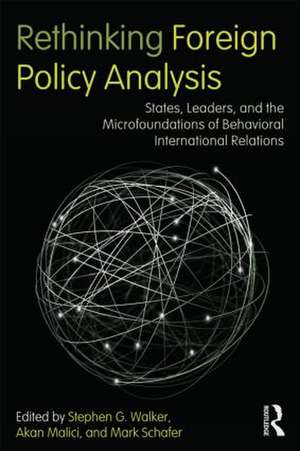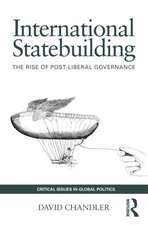Rethinking Foreign Policy Analysis: States, Leaders, and the Microfoundations of Behavioral International Relations: Role Theory and International Relations
Editat de Stephen G. Walker, Akan Malici, Mark Schaferen Limba Engleză Paperback – 8 dec 2010
The first part of this ground-breaking book establishes the theoretical framework of neobehavioral IR, setting the stage for the remainder of the work to apply the framework to pressing issues in world politics. Through these applications students can see how a game-theoretic logic can combine with the operational code research program to innovatively combine levels of analysis. The authors employ binary role theory to demonstrate that relying only on a state-systemic level or an individual-decision making level of analysis leads to an incomplete picture of how leaders steer their ships of state through the hazards of international crises to establish stable relations of cooperation or conflict.
| Toate formatele și edițiile | Preț | Express |
|---|---|---|
| Paperback (1) | 453.27 lei 6-8 săpt. | |
| Taylor & Francis – 8 dec 2010 | 453.27 lei 6-8 săpt. | |
| Hardback (1) | 1115.02 lei 6-8 săpt. | |
| Taylor & Francis – 8 dec 2010 | 1115.02 lei 6-8 săpt. |
Din seria Role Theory and International Relations
-
 Preț: 310.08 lei
Preț: 310.08 lei -
 Preț: 311.41 lei
Preț: 311.41 lei -
 Preț: 404.11 lei
Preț: 404.11 lei -
 Preț: 383.33 lei
Preț: 383.33 lei -
 Preț: 386.51 lei
Preț: 386.51 lei -
 Preț: 408.38 lei
Preț: 408.38 lei -
 Preț: 411.42 lei
Preț: 411.42 lei - 16%
 Preț: 298.58 lei
Preț: 298.58 lei -
 Preț: 316.95 lei
Preț: 316.95 lei - 19%
 Preț: 242.79 lei
Preț: 242.79 lei -
 Preț: 378.71 lei
Preț: 378.71 lei -
 Preț: 385.71 lei
Preț: 385.71 lei -
 Preț: 389.66 lei
Preț: 389.66 lei -
 Preț: 381.98 lei
Preț: 381.98 lei -
 Preț: 389.66 lei
Preț: 389.66 lei - 20%
 Preț: 259.98 lei
Preț: 259.98 lei - 18%
 Preț: 1001.87 lei
Preț: 1001.87 lei - 9%
 Preț: 935.77 lei
Preț: 935.77 lei
Preț: 453.27 lei
Nou
Puncte Express: 680
Preț estimativ în valută:
86.73€ • 90.81$ • 71.94£
86.73€ • 90.81$ • 71.94£
Carte tipărită la comandă
Livrare economică 10-24 aprilie
Preluare comenzi: 021 569.72.76
Specificații
ISBN-13: 9780415886987
ISBN-10: 0415886988
Pagini: 336
Ilustrații: 22 tables and 38 line drawings
Dimensiuni: 152 x 229 x 15 mm
Greutate: 0.54 kg
Ediția:1
Editura: Taylor & Francis
Colecția Routledge
Seria Role Theory and International Relations
Locul publicării:Oxford, United Kingdom
ISBN-10: 0415886988
Pagini: 336
Ilustrații: 22 tables and 38 line drawings
Dimensiuni: 152 x 229 x 15 mm
Greutate: 0.54 kg
Ediția:1
Editura: Taylor & Francis
Colecția Routledge
Seria Role Theory and International Relations
Locul publicării:Oxford, United Kingdom
Cuprins
Part 1: Foreign Policy Analysis 1. Foreign Policy Analysis and Behavioral International Relations Stephen G. Walker 2. Macropolitics and Foreign Policy Decisions: The Billiard Ball Model of IR Stephen G. Walker 3. Micropolitics and Foreign Policy Decisions: The Behavioral Model of IR Stephen G. Walker 4. Quantum Politics and Operational Code Analysis: Theories and Methods Stephen G. Walker Part 2: Foreign Policy Decision Making 5. The United States and Rogue Leaders: Understanding the Conflicts Akan Malici 6. Deceptive Bargaining and Nuclear Ambitions: Prospect Theory and North Korea’s Decision to Go Nuclear Kai He and Huiyun Feng 7. Small Group Dynamics: The Psychological Characteristics of Leaders and the Quality of Group Decision Making Mark Schafer, Jonathon Nunley, and Scott Crichlow 8. Alliances and Their Microfoundations: France and Britain in the 9/11 Era Akan Malici Part 3: Foreign Policy Learning 9. Learning to Resist or Resisting to Learn? The Operational Codes of Fidel Castro and Kim Il Sung Akan Malici 10. Stability and Change in Belief Systems: The Operational Code of George W. Bush from Governor to Second Term President Jonathan Renshon 11. Experiential Learning by U.S. Presidents: Domestic, International, and Psychological Influences in the Post-Cold War World Samuel Robison 12. Cognitive Responses by U.S. Presidents to Foreign Policy Crises: Belief Changes in Response to Positive and Negative Experiences B. Gregory Marfleet and Hannah Simpson Part 4: Foreign Policy Dynamics 13. Dueling with Dictators: Explaining the Strategic Interaction Patterns of U.S. Presidents and Rogue Leaders Stephen G. Walker and Mark Schafer 14. Binary Role Theory: Reducing Uncertainty and Managing Complexity in Foreign Policy Analysis Stephen G. Walker 15. The Integration of Foreign Policy Analysis and International Relations Stephen G. Walker. Appendix. Formal Models of Symbolic and Strategic Interaction Stephen G. Walker
Notă biografică
Stephen G. Walker is emeritus professor of political science at Arizona State University.
Akan Malici is assistant professor of political science at Furman University.
Mark Schafer is professor of political science at University of Central Florida.
Akan Malici is assistant professor of political science at Furman University.
Mark Schafer is professor of political science at University of Central Florida.
Recenzii
"The book is helpful to understand the effects of socio-psychological factors upon the foreign policy process by using the Operational Codes; therefore, I suggest students read it carefully."
—Ertan Efegil, Perceptions Journal of International Affairs, Vol. 17, 3, Autumn 2012
"Rethinking Foreign Policy Analysis is a bold and exciting undertaking. It expands a behavioral theory of foreign policy that draws out the logical and empirical linkages between foreign policy and international relations, reconfiguring the two as a unified subject of study. By building on the insights of branches of psychology and what the authors term thick rational choice, they solve many of the problems that have bedeviled international relations researchers for decades. Rethinking Foreign Policy Analysis will stand as a foundational book that helps propel forward our understanding of foreign affairs."
—Bruce Bueno de Mesquita, Julius Silver Professor of Politics and director of the Alexander Hamilton Center for Political Economy at NYU and Senior Fellow, Hoover Institution, Stanford University
"This book provides an outstanding treatment of Behavioral IR. The subject matter, from the traditional billiard ball model through state of the art material on operational codes, is presented with clarity and precision. Academics and practitioners alike will benefit from reading this impressive effort to synthesize insights about how foreign policy is made and carried out."
—Patrick James, University of Southern California
"This book is much more than an impressive collection of path-breaking research on leaders and strategic interactions. It connects and moves the study of foreign policy and international relations by grounding these areas in underlying epistemological debates. It is a must read for students and scholars of foreign policy and international politics."
—Juliet Kaarbo, The University of Kansas
"The authors’ research programme of behavioral IR is just the theoretical shot in the arm the field needs at this time. Their unifying theory of beliefs and actions, rational choice and cognitivism, texts and events, is unlike any heretofore seen."
—Valerie Hudson, Brigham Young University
"Rethinking Foreign Policy Analysis makes a very important contribution to the growing sub-field of Behavioral International Relations (BIR)."
—Alex Mintz, Lauder School of Government, Diplomacy and Strategy
"Rethinking Foreign Policy Analysis provides a rich discussion of how foreign policy analysis fits into the broader international relations field and advances the importance of taking a foreign policy approach to understand world politics. This book is essential reading for students of international relations and foreign policy alike. The arguments that the authors make will influence how both new and established scholars approach research for years to come."
—A. Cooper Drury, University of Missouri
"Rethinking Foreign Policy Analysis deserves a place on the shelf of all empirically oriented IR and FPA scholars, especially those who have either despaired of, or been content with, the separation between those two fields of study."
- Valerie M. Hudson, Perspectives on Politics, March 2013, Vol.11/No.1
—Ertan Efegil, Perceptions Journal of International Affairs, Vol. 17, 3, Autumn 2012
"Rethinking Foreign Policy Analysis is a bold and exciting undertaking. It expands a behavioral theory of foreign policy that draws out the logical and empirical linkages between foreign policy and international relations, reconfiguring the two as a unified subject of study. By building on the insights of branches of psychology and what the authors term thick rational choice, they solve many of the problems that have bedeviled international relations researchers for decades. Rethinking Foreign Policy Analysis will stand as a foundational book that helps propel forward our understanding of foreign affairs."
—Bruce Bueno de Mesquita, Julius Silver Professor of Politics and director of the Alexander Hamilton Center for Political Economy at NYU and Senior Fellow, Hoover Institution, Stanford University
"This book provides an outstanding treatment of Behavioral IR. The subject matter, from the traditional billiard ball model through state of the art material on operational codes, is presented with clarity and precision. Academics and practitioners alike will benefit from reading this impressive effort to synthesize insights about how foreign policy is made and carried out."
—Patrick James, University of Southern California
"This book is much more than an impressive collection of path-breaking research on leaders and strategic interactions. It connects and moves the study of foreign policy and international relations by grounding these areas in underlying epistemological debates. It is a must read for students and scholars of foreign policy and international politics."
—Juliet Kaarbo, The University of Kansas
"The authors’ research programme of behavioral IR is just the theoretical shot in the arm the field needs at this time. Their unifying theory of beliefs and actions, rational choice and cognitivism, texts and events, is unlike any heretofore seen."
—Valerie Hudson, Brigham Young University
"Rethinking Foreign Policy Analysis makes a very important contribution to the growing sub-field of Behavioral International Relations (BIR)."
—Alex Mintz, Lauder School of Government, Diplomacy and Strategy
"Rethinking Foreign Policy Analysis provides a rich discussion of how foreign policy analysis fits into the broader international relations field and advances the importance of taking a foreign policy approach to understand world politics. This book is essential reading for students of international relations and foreign policy alike. The arguments that the authors make will influence how both new and established scholars approach research for years to come."
—A. Cooper Drury, University of Missouri
"Rethinking Foreign Policy Analysis deserves a place on the shelf of all empirically oriented IR and FPA scholars, especially those who have either despaired of, or been content with, the separation between those two fields of study."
- Valerie M. Hudson, Perspectives on Politics, March 2013, Vol.11/No.1
Descriere
Rethinking Foreign Policy Analysis presents the definitive treatment to integrate theories of foreign policy analysis and international relations—addressing the agent-centered, micro-political study of decisions by leaders and the structure-oriented macro political study of state interactions in an international system.











